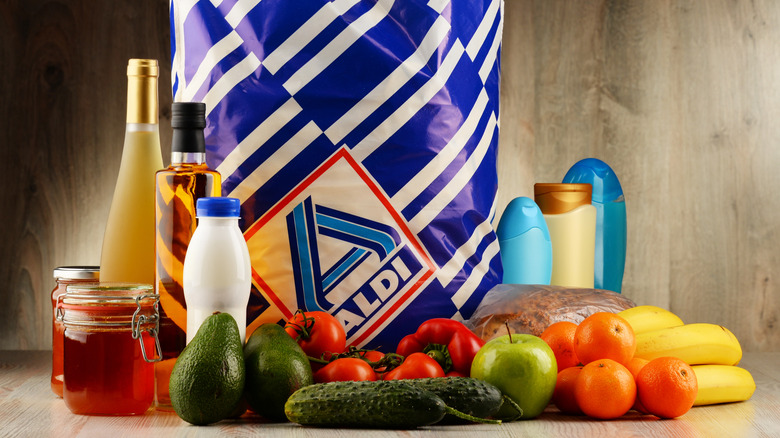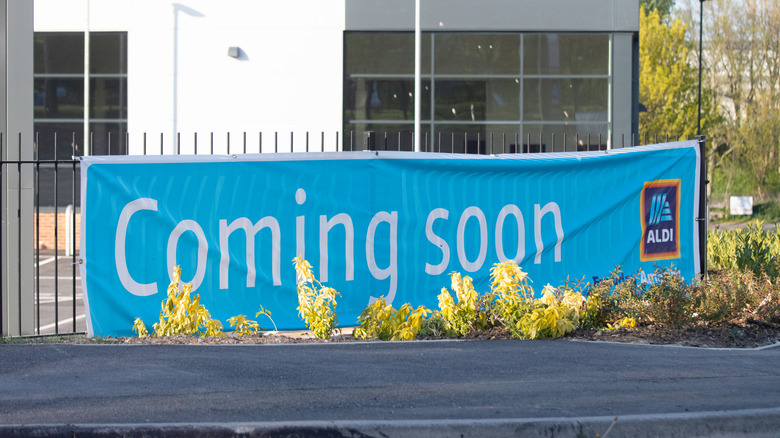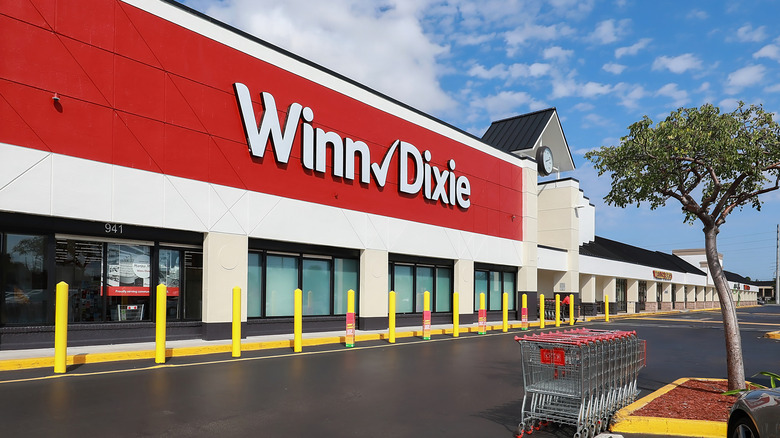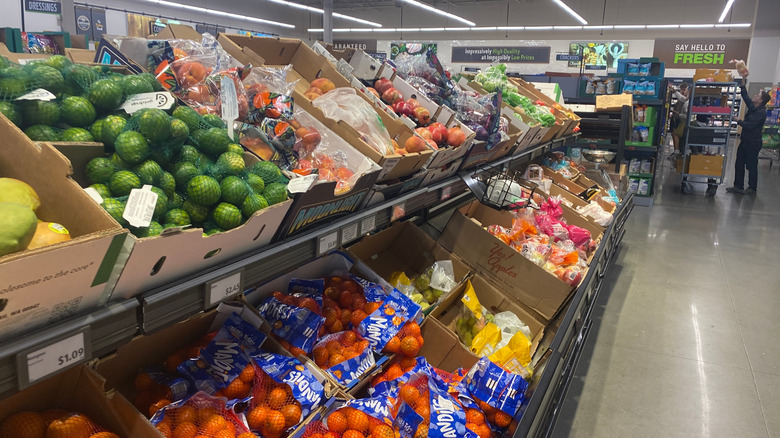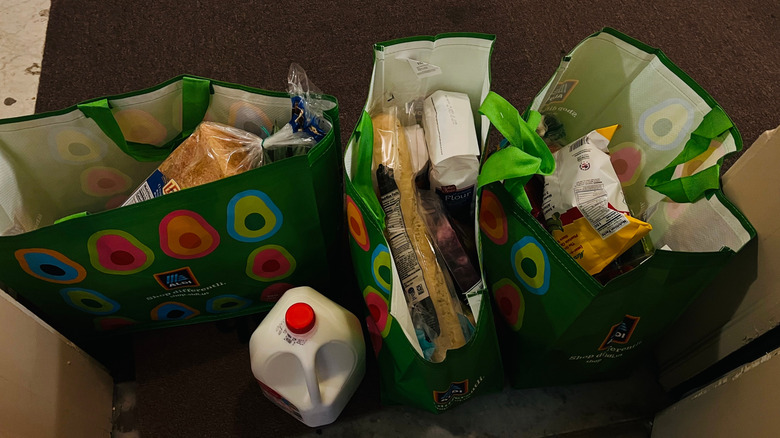Big Changes Are Coming To Aldi In 2025
The cult status of discount grocer Aldi is real — some fans even carry special holders for their shopping cart quarters (we're partial to this sloth-themed Aldi quarter holder keychain). With inflation hitting wallets hard in recent years, Aldi's prices — which can be as low as half the cost of other grocers — are a big draw for anyone balling on a budget. But just because it's one of the least expensive grocery chains in the U.S. doesn't mean Aldi isn't actively investing oodles of money into its future.
In fact, Aldi is investing billions into its growth and evolution, with big changes planned for 2025. From doubling down on its sustainability goals to snagging a larger market presence, Aldi is on a mission to grow its fanbase and become even more of a household name. Here are some of the biggest changes we can expect to see from Aldi in 2025.
Aldi's aggressive expansion
Aldi is looking to the future by expanding its U.S. footprint, with 800 new stores planned to open by 2028. This expansion is fueled by a $9 billion investment, with a particular focus on the Northeast, Midwest, and West. This means the chain will set up shop in new cities like Las Vegas for the first time. As for 2025, in particular, new stores will open in 13 states, including New Jersey, Pennsylvania, and Ohio.
This massive expansion will bring Aldi closer to the big dogs. The added stores will take the brand's presence to around 3,000 locations (just trailing behind Walmart's nearly 5,000), which is on par with stores under the Kroger umbrella.
But one thing Aldi has going for it that the other chains don't is its ambition to be the most sustainable grocer in America. This is largely why the company plans to roll out new features for its stores. Some of these include solar power systems on the roof, energy-efficient lighting, and new eco-refrigeration systems.
Aldi is converting Winn-Dixie and Harvey's supermarkets
In 2024, Aldi acquired Southeastern Grocers, the parent company of Winn-Dixie and Harvey's grocery stores. This is part of the company's massive expansion, and some of these stores will be converted to new Aldi locations. Aldi has already begun the process of giving 50 an Aldi makeover, with most of these on track to open in 2025.
However, not all Winn-Dixie and Harvey's stores will transition. This makes sense, as a typical Winn-Dixie is about twice the size of an Aldi, so many will continue to operate under the original brand name. The company hasn't revealed specifics about any upcoming changes for Winn-Dixie and Harvey's locations operating under the Aldi umbrella, so only time will tell what its influence might be for these well-known grocery names.
Some people who live near the locations slated for conversion, however, have expressed mixed feelings on the change, with many pointing out that there are things you won't find at Aldi that they can get from Winn-Dixie or Harvey's (for example, a deli counter and money transfer services). One user on X, formerly known as Twitter, wrote, "They can take the midcity Winn-Dixie from my cold, dead hands." But, for the Winn-Dixie fans living near a remaining store, at least Aldi plans to keep the Winn-Dixie rewards program.
Aldi is adding more sustainable packaging
It's no secret to Aldi fans that the chain has been on a hardcore mission to increase its sustainability initiatives. For example, the company announced in January 2024 that it was getting rid of plastic bags in all of its U.S. stores. Even before this move, the store charged customers for each bag — an incentive for shoppers to buy reusable bags or bring some from home (here's a fun Aldi-themed canvas tote for more forgetful shoppers).
Aldi's goal of cutting down on plastic will continue throughout 2025, with the chain aiming to have 100% of its private-label packaging reusable, recyclable, or compostable by the end of the year. It's been making progress in this area throughout 2024, with the chain saying it's already passed the 75% benchmark toward this goal. From nifty solutions like paper-based wine bottles to wrapping bananas in paper bands (rather than plastic), Aldi is quick to think outside the box.
By the end of 2025, Aldi also wants to reduce its private-label packaging by 15% overall and add more recycled content to the plastic packaging it uses. It's even harnessing watermark technology to help with packaging recycling efforts.
Aldi wants more sustainable products
With sustainability clearly in its crosshairs, Aldi is chasing additional opportunities to reach its green goals by partnering with other sustainable companies. From relying on produce suppliers that practice sustainable farming to responsibly sourcing materials and products like fish and seafood, Aldi is making major waves with its supplier partnerships.
You'll almost never see name brands at Aldi since about 90% of the products it sells are exclusive to the store. This gives Aldi a lot of say in every step of the manufacturing process and supply chain. The company also focuses on certification and innovative supply-chain tracking for transparency across a product's lifecycle. Aldi has said it plans to launch various projects to help suppliers reduce emissions, and its many global markets are encouraged to buy products locally when possible to help reduce the carbon footprint of deliveries.
In most grocery stores, choosing a fair-trade coffee or chocolate or opting for sustainable, certified products can run up your final bill. But Aldi claims it wants these options to be the standard in its stores while keeping its discount-retailer reputation, hopefully making sustainable options more affordable for the average shopper.
